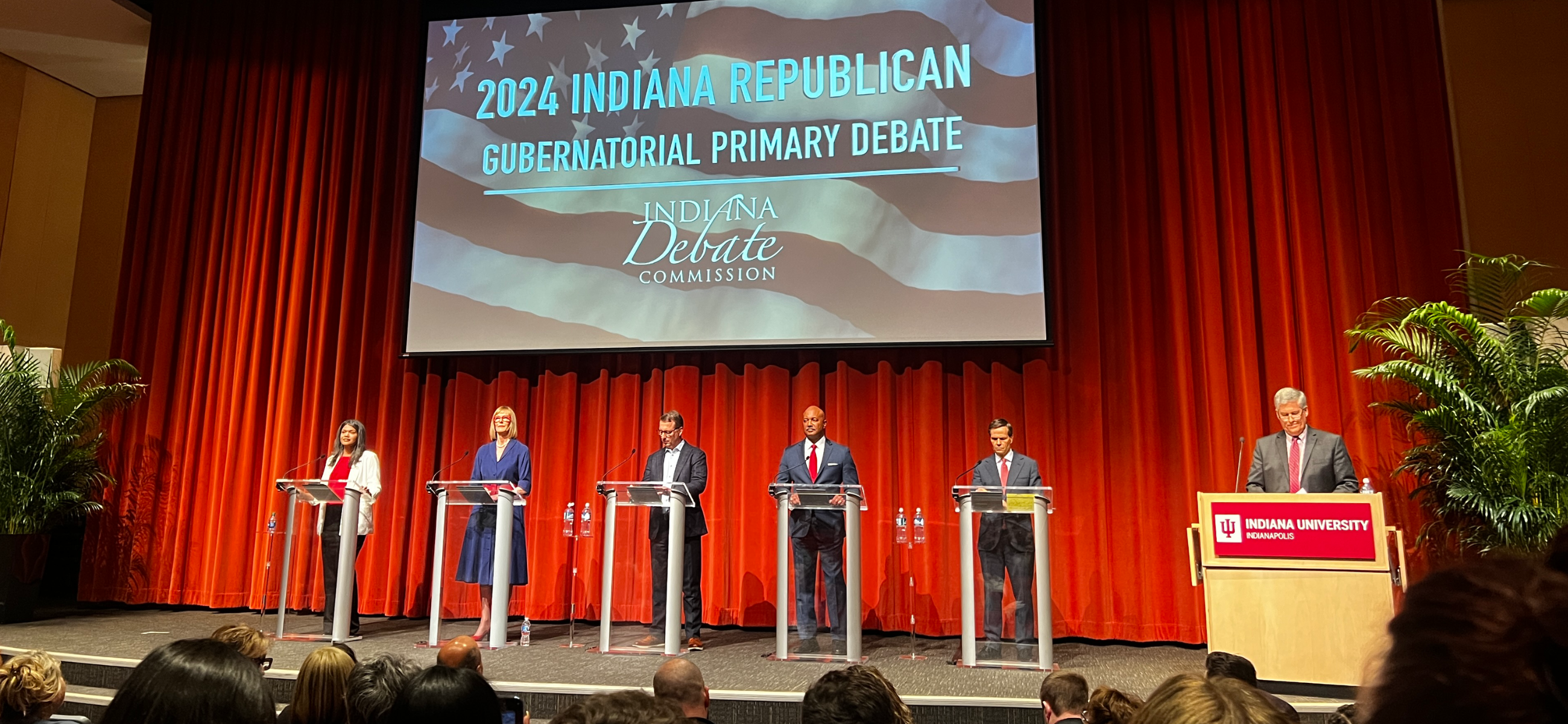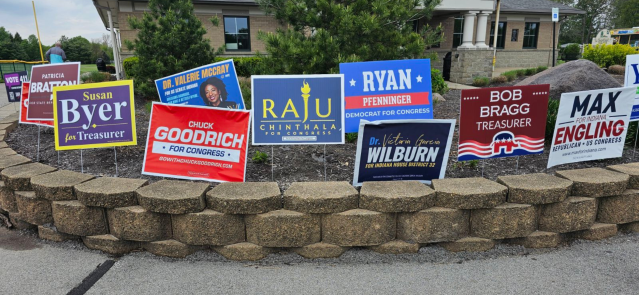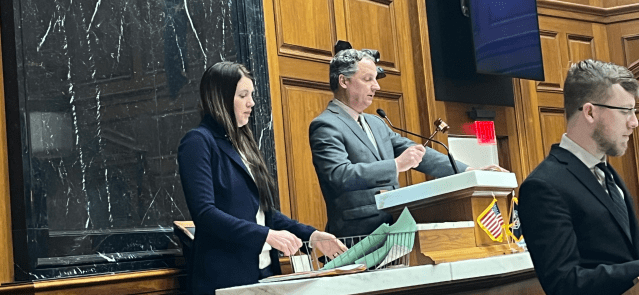Stay ahead of the curve as a political insider with deep policy analysis, daily briefings and policy-shaping tools.
Request a Demo
Republican gubernatorial candidates Jamie Reitenour, left, Suzanne Crouch, Eric Doden, Curtis Hill and Brad Chambers participate in the final debate before the primary. (Credit: Suzanne Crouch campaign)
INDIANAPOLIS — Five hopefuls vying for the chance to be Indiana’s next governor took each other to task — and at times fought the questions themselves — on economic development, social issues, election integrity and more during Tuesday’s Republican gubernatorial debate hosted at Indiana University-Purdue University Indianapolis.
The debate, the last of the primary cycle and sponsored by the Indiana Debate Commission, at times spiraled into revolt, as candidates disagreed with moderator Jon Schwantes’ yes-no questions on election integrity and immigration. In other moments, the candidates stuck to their various platforms on taxes, education and beyond.
Former state Secretary of Commerce Brad Chambers, Lt. Gov. Suzanne Crouch, Fort Wayne businessman Eric Doden, former state Attorney General Curtis Hill and Indianapolis mom Jamie Reitenour participated.
Sen. Mike Braun, who has thus far led the crowded field in the polls, informed the Debate Commission on Monday that he would not attend the debate. He returned to Washington, D.C., where he cast one of 19 dissenting votes against a $95 billion aid package for Ukraine, Israel and Taiwan. The bill passed the Senate on a 80-19 vote.
Braun’s rivals targeted him several times in his absence, but the five candidates on stage mostly focused on one another throughout the debate. Gov. Eric Holcomb, a frequent target in previous debates, was hardly mentioned.
Schwantes, host of the WFYI-FM series “Indiana Lawmakers,” read from a slate of questions submitted in part by state voters and selected by the Debate Commission.
Election integrity
The night’s first major clash occurred during yes-no questioning on the safety and authenticity of the country’s elections.
Each candidate except Reitenour said they were confident in Indiana’s election integrity. All acknowledged the 2020 election was not stolen.
Asked if Joe Biden was the duly elected president, Hill and Reitenour pushed back, saying “anomalies” were not properly investigated.
The candidates essentially refused to answer a question asking if they would accept the 2024 election results, saying it was too hypothetical.
Agreement on abortion
Several questions were asked about abortion, though the candidates largely agreed on the issue.
The group was asked whether the state’s current abortion ban, which includes exceptions for rape, maternal health and other limited circumstances, was sufficient.
Chambers, Doden and Crouch agreed it was.
Hill called for increased enforcement of the ban, saying the state’s health department is not providing the necessary reports for terminated pregnancies.
“I brought 2,411 unborn babies from Illinois to have them buried in Indiana to establish their humanity,” Hill said, referencing a 2020 action he took as attorney general.
Reitenour did not answer the question directly, saying only that “we need to be a state that says we are for life.”
The group refused to answer when Schwantes asked if they agreed with the Indiana Supreme Court, which he said found the maternal health exception to be necessary under state law.
The candidates also agreed on in vitro fertilization, saying it should be allowed in Indiana. Some conservative states have targeted the procedure as part of the abortion debate.
Return to the IEDC
The Indiana Economic Development Corp. (IEDC), and particularly its LEAP Innovation District project seeking to build a ready-made space for business in Lebanon, Indiana, was a return topic from past debates. Chambers and Doden previously led the organization, and Chambers rose in defense of the LEAP District.
Reitenour called the project “putting a whale of a company in the middle of the desert with no water.”
Doden also directly criticized it, saying the IEDC existed only to help businesses navigate government rules.
Hill called the IEDC “a shadow government” that needed to be “reined in.”
Crouch used the question to launch into her plan to get rid of the state’s income tax.
“It’s a terrific contrast between career politicians and small thinking,” Chambers said in response to the criticisms.
Chambers goes after Crouch
Crouch was asked whether it made financial sense to cut the income tax, which brings in billions in state revenue each year.
Chambers seized on the topic.
“It’s a political talking point if ever there was one,” he said. “She has not told us how much she’s going to have to cut education, public safety, police, mental health or health care.”
Crouch doubled down, noting the income tax is already phasing down to below 3% in the coming years.
“Let’s just keep going in that direction when we have excess surplus in revenues,” she said.
Differing education approaches
A question about improving Indiana schoolchildren’s test scores led to a contrast in policy approach.
Doden and Crouch focused on school choice and workplace development.
Chambers said students require individualized learning opportunities.
Reitenour railed against critical race theory and social-emotional learning, saying kindergarten through fifth grade students need more focus on educational fundamentals.
Hill urged schools to stop taking federal money that requires certain programs, which Crouch joined in supporting.
Closing statements
Candidates were allowed to summarize their candidacy in final closing statements.
Chambers focused on his economic plan, likening his hopes for the state to his career as a businessman.
“We believe it’s time for a CEO, someone to run [the state] like a business,” Chambers said.
Hill leaned into social issues, railing against abortion and claiming “there are only two genders.”
“Don’t let politicians give you a laundry list of conservative talking points and say that’s enough,” Hill said. “Prove you can do the job.”
Doden focused on his platform talking points: restoring small towns, growing the economy and expanding zero-cost adoption.
“We have more plans in writing than everyone on this stage combined,” Doden said.
Crouch returned to her key proposal, which would eliminate the state’s income tax.
“My opponents say it’s a gimmick, but what they’re really saying is the government needs more of your money and you need less of it,” Crouch said.
Reitenour said God called her to run and cast doubt on Indiana’s conservative reputation.
“We live in a state that says it’s a red state and believes in conservative values, and yet I am trying to figure out where the conservatives are in government,” she said.
Read this related story
Contact Rory Appleton on X at @roryehappleton or email him at [email protected].
And subscribe to State Affairs so you do not miss an update.
Facebook @stateaffairsin
Instagram @stateaffairsin
LinkedIn @stateaffairs
Read this story for free.
Create AccountRead this story for free
By submitting your information, you agree to the Terms of Service and acknowledge our Privacy Policy.
Here’s how to vote in Indiana’s primary election
Thousands of Hoosier voters will head to the polls Tuesday, May 7, for Indiana’s primary election. This year’s ballot includes a competitive contest for governor, as well as dozens of state and federal legislative races and a few school referenda. The primary will decide which candidates will represent their respective parties in the Nov. 5 …
$15B in 72 hours: ‘Our economy is on fire,’ says Commerce chief
A banner week for investment within Indiana has capped off the state’s biggest financial quarter in recent history, as three major companies agreed to deals estimated to bring in billions of dollars.
The state has long advertised itself as business-friendly, and its chief executive appeared thrilled by the week’s news.
“This is about $15 billion in about 72 hours,” Gov. Eric Holcomb told reporters on Friday. “This used to take four years to achieve.”
One announced project, an $11 billion Amazon Web Services data center in north-central Indiana, is the biggest single investment in the state’s history.
Google also broke ground on a $2 billion data center near Fort Wayne, while Toyota announced a $1.4 billion investment in its Princeton plant.
“Our economy is on fire,” Secretary of Commerce David Rosenberg said.
His agency, the Indiana Economic Development Corp., negotiated the deals. The state is offering millions of dollars in tax incentives in order to create some 1,500 new jobs.
“These industries bring generational change for families, putting more money in their pockets and allowing them the opportunity to have a better quality of life on their own,” Rosenberg said.
The projects
Amazon’s new data center will be built near New Carlisle. It’s expected to bring in at least 1,000 new jobs in the artificial intelligence and cloud storage sectors. No timetable for completion of the project was given.
According to Amazon, the company has invested $21.5 billion in Indiana since 2010, creating 26,000 full- and part-time jobs.

Google’s new data center will hire up to 200 new workers, the tech giant said, “in the coming years.”
Toyota will build a new assembly line that will assemble battery-operated SUVs by the end of 2025. It expects to add up to 340 new jobs to the plant, which Toyota said now employs more than 7,500.
The company has spent $8 billion on the Princeton plant since breaking ground in 1996, Toyota said.
The new projects’ figures represent early estimates and could change as they move forward.
Incentives aren’t the only factor
Rosenberg praised the Indiana General Assembly for passing legislation that allows the state to offer sales tax exemptions as a lure for new businesses. Both Amazon and Google will receive such boosts, and the Amazon project could receive up to $100 million in additional credits based on various incentives.
But Rosenberg stressed tax breaks are only part of the equation as the state looks to compete internationally.
“We don’t have to have the highest offer because we bring the university partners, the state and local governments, utilities — everyone around the table to make sure that company has what they need,” he said.
The Google project, for example, includes partnerships with Ivy Tech Community College on a new job training program and Indiana Michigan Power to bring clean energy resources to the local grid.
Recruiting new industries
Rosenberg said tech recruitment has been a particular focus for the IEDC, as Indiana is looking to provide an “ecosystem” for these companies to thrive off one another. The state’s semiconductor facilities will provide the materials needed for these new data centers, he noted.
Recruiting new business takes anywhere between six months to several years. Zoning, road construction, utilities and more need to be worked out ahead of time.
The IEDC has been on a hot streak, Rosenberg said. During the agency’s first 11 years, it secured just under $50 billion in new projects. It has now pulled in more than $71 billion since the beginning of 2022.
In the first four months of 2024, $20.68 billion has been pledged to projects in Indiana — the most for a quarter since IEDC’s founding in 2005.
‘Strong partners for the Indiana economy’
“The key is that these investments represent long-lasting and continued commitment to being strong partners for the Indiana economy,” said Andrew Butters, an associate professor of business economics and public policy at Indiana University’s Kelley School of Business.
Large companies came out of the pandemic looking to reorient their supply chains, Butters said, and some states have reaped the benefits of projects that might have previously moved overseas.
Indiana has been able to compete by selling its location, workforce, labor force participation in addition to offering incentives, Butters said.
“I would not be shocked to see more of these as the state attempts to transition toward more high-tech and high-skill industries,” Butters said.
Contact Rory Appleton on X at @roryehappleton or email him at [email protected].
6 races to watch in the Indiana primary election
The first openly competitive contest for the Republican gubernatorial nomination in a generation will end with Tuesday’s primary election, as will crowded races for several open congressional seats.
The primary won’t officially decide any political race — only the Nov. 5 general election can do that. But Republicans hold major advantages in statewide and many district-level contests, and who secures which nominations will go a long way toward deciding who may lead the state in the years to come.
>> Related: How does voting by political party work in Indiana?
Here are six key primary contests to watch on election night.
Governor
The race to be Indiana’s next chief executive has been perhaps the most noteworthy of the election cycle, with six Republicans bringing a variety of experience and outsider credentials to the competition.
Sen. Mike Braun has led in the polls from day one, including running up a 34 percentage-point lead in an April State Affairs/Howey Politics Indiana survey.
The other five candidates are: Lt. Gov. Suzanne Crouch, former Attorney General Curtis Hill, Indianapolis mom Jamie Reitenour and two former state secretaries of commerce in Brad Chambers and Eric Doden.
The winner of Tuesday’s Republican primary will face Democrat and former state Superintendent of Public Instruction Jennifer McCormick, who will advance for her party unopposed.
Republican candidates spent tens of millions of dollars in an attempt to stand out in their crowded pack. The primary race also featured four televised debates, including a chaotic final display on April 24.
U.S. Senate
Two Democrats are vying for the chance to replace Braun in the U.S. Senate: Former state Rep. Marc Carmichael and Valerie McCray, a clinical psychologist.
Carmichael has outspent McCray in the race by a margin of nearly $63,000 to $15,000.
Both are attempting to become the state’s first Democratic senator since Joe Donnelly’s election in 2012.
Rep. Jim Banks is running unopposed in the Republican primary.
3rd Congressional District
Banks’ entry into the Senate race leaves his seat in Congress open, and a bevy of Republicans are seeking to replace him: Grant Bucher, Wendy Davis, Mike Felker, Jon Kenworthy, Tim Smith, Marlin A. Stutzman, Eric Whalen and Andy Zay.
State Affairs has identified Stutzman, a former congressman; Smith, a self-funding former Fort Wayne mayoral candidate; and Davis, a former Allen County judge, as candidates to watch in the crowded race.
Kiley Adolph and Phil Goss are running against one another in the Democratic primary.
5th Congressional District
After initially deciding against another run, Republican Rep. Victoria Spartz reversed course to seek re-election in 2024.
Eight other Republicans are running against Spartz: Raju Chinthala, Max Engling, Chuck Goodrich, Mark Hurt, Patrick Malayter, Matthew Peiffer, L.D. Powell and Larry L. Savage Jr.
Goodrich, a member of the Indiana House of Representatives, has spent more than $2 million on TV ads as he seeks to unseat Spartz, according to AdImpact.
Two Democrats, Ryan Pfenninger and Deborah A. Pickett, are on the ballot.
6th Congressional District
Seven Republicans are attempting to replace retiring Rep. Greg Pence: Jamison E. Carrier, Darin Childress, Bill Frazier, John Jacob, state Sen. Jeff Raatz, Jefferson Shreve and state Rep. Mike Speedy.
Shreve, who ran unsuccessfully for Indianapolis mayor in 2023, has spent nearly $4 million — predominantly through TV advertising — in his bid.
Cynthia Wirth, whom Pence defeated by 35 percentage points in 2022, is running unopposed in the Democratic primary.
8th Congressional District
Republican Rep. Larry Bucshon is also retiring, and a dozen candidates in both parties are seeking to fill his seat.
On the Republican side, former Rep. John Hostettler, state Sen. Mark Messmer, former President Donald Trump White House staff member Dominick Kavanaugh and frequent Bucshon primary challenger Richard Moss are each making a push.
Fellow Republicans Jim Case, Jeremy Heath, Luke Misner and Kristi Risk are also running but trail the above pack in campaign spending.
Four Democrats are also seeking a nomination: Erik Hurt, Peter FH Priest II, Edward Upton Sein and Michael Talarzyk.
Contact Rory Appleton on X at @roryehappleton or email him at [email protected].
State Republicans keep spending to protect House incumbents in primary
House Speaker Todd Huston expressed confidence Tuesday that Republican House members will prevail over challengers in next week’s primary. Nineteen of the 63 House Republicans seeking reelection this year are facing primary races. Those challenges have been lower-key than two years ago when about two dozen candidates seized on COVID-19 discontent and other issues in …




